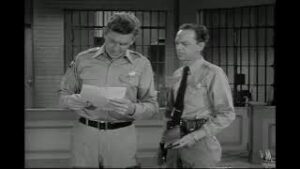
Introduction: What Led to the CBS Lawsuit?
Did you ever think uploading old TV episodes could land you in legal trouble? That’s exactly what happened to a YouTuber who posted episodes of The Andy Griffith Show. CBS, the network holding the copyright, decided to take serious action, suing the YouTuber for unauthorized distribution. This case sheds light on the often-overlooked legal risks of sharing copyrighted content online.
Why Is CBS Protecting ‘The Andy Griffith Show’?
CBS isn’t just protecting an old TV show; they’re safeguarding their intellectual property. The Andy Griffith Show, despite its age, remains a valuable asset. It’s a beloved piece of Americana that still generates revenue through syndication, DVD sales, and streaming.
The Power of Nostalgia: Why ‘The Andy Griffith Show’ Still Matters
Why would CBS go after a YouTuber over a show that aired decades ago? The answer lies in nostalgia. Fans of the series still tune in, and CBS knows the value of keeping that legacy intact. Allowing unauthorized uploads could dilute their control over the show’s distribution.

Understanding Copyright Law in the Digital Age
At the core of this legal battle is copyright law. These laws exist to protect creators and rights holders from unauthorized use of their work. But how does this apply to YouTube and similar platforms? Let’s dive into the legal framework.
What Does Copyright Protect?
Copyright protects original works of authorship, including movies, TV shows, and even the scripts behind them. It gives the creator—or the entity that owns the rights—the exclusive ability to distribute, reproduce, and display the work.
Fair Use: The Common Defense
Some YouTubers argue their uploads fall under “fair use.” However, fair use is a tricky defense. It only applies under specific circumstances, such as criticism, commentary, or parody. Posting full episodes of The Andy Griffith Show likely doesn’t qualify.
How YouTube’s Policies Play a Role
YouTube has stringent policies regarding copyrighted material. Its Content ID system scans uploads for protected content. When flagged, the rights holder can either monetize, block, or issue a takedown notice for the video.
Did the YouTuber Ignore Takedown Notices?
In this case, it appears the YouTuber either ignored takedown requests or continued uploading after receiving warnings. This likely escalated the situation, leading CBS to pursue legal action.
CBS’s Legal Strategy: Setting a Precedent
This lawsuit isn’t just about one YouTuber; it’s about sending a message. CBS wants to set a precedent that unauthorized sharing of their content will not be tolerated. This deters others from following suit.
The Consequences for the YouTuber
What happens when a giant like CBS takes legal action against an individual? The repercussions can be severe, ranging from hefty fines to potential criminal charges.
Financial Penalties
Copyright infringement lawsuits can result in significant financial penalties. Depending on the court’s ruling, the YouTuber could owe thousands, if not millions, in damages.
Reputational Damage
Aside from financial loss, the YouTuber’s reputation takes a hit. Being sued by a major network is no small matter and can discourage future partnerships or audience growth.
The YouTuber’s Defense: Can They Fight Back?
While CBS has a strong case, the YouTuber might attempt a defense. They could argue fair use or challenge the scope of CBS’s copyright claims. However, success in such defenses is rare.
What This Means for Content Creators
This case serves as a wake-up call for content creators. Sharing copyrighted material without permission can lead to serious legal consequences. But how can creators stay on the right side of the law?
Seek Permission or Licenses
Before uploading, always seek permission or obtain the necessary licenses. This might seem tedious, but it’s the safest route.
Create Original Content
The safest bet is to focus on creating original content. Not only does this avoid copyright issues, but it also helps build a unique brand.
The Role of Fans in Keeping Nostalgia Alive
Fans often upload old shows to share their love for them. However, this lawsuit highlights the tension between fan culture and copyright enforcement. Can a balance be struck?
Fan Communities and Legal Content Sharing
Some networks work with fan communities to share content legally, using platforms like YouTube to post clips or highlight reels. Perhaps CBS could explore similar options to engage fans without sacrificing control.
How This Case Could Shape Future Copyright Enforcement
The outcome of this lawsuit might influence how other networks handle copyright issues in the digital age. Will they crack down harder, or find ways to coexist with content creators?
Conclusion
The CBS lawsuit against a YouTuber for posting episodes of The Andy Griffith Show is more than a legal battle—it’s a lesson in the complexities of copyright law. As nostalgia-driven content continues to thrive, creators and networks must navigate the fine line between fan engagement and legal protection.
FAQs
1. Why is CBS suing the YouTuber?
CBS is suing the YouTuber for posting full episodes of The Andy Griffith Show without permission, violating copyright laws.
2. What is copyright infringement?
Copyright infringement occurs when someone uses copyrighted material without the rights holder’s permission, such as distributing or displaying it publicly.
3. Can fair use protect YouTubers?
Fair use might protect certain uses like commentary or parody, but uploading full episodes typically doesn’t qualify.
4. What are the potential consequences of copyright infringement?
Consequences can include fines, legal fees, and even criminal charges, depending on the severity of the infringement.
5. How can content creators avoid copyright issues?
Creators should either seek permission, obtain licenses, or focus on producing original content to avoid legal trouble